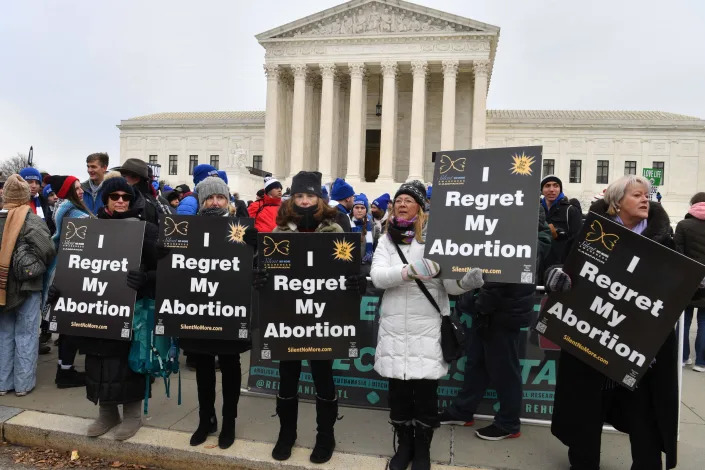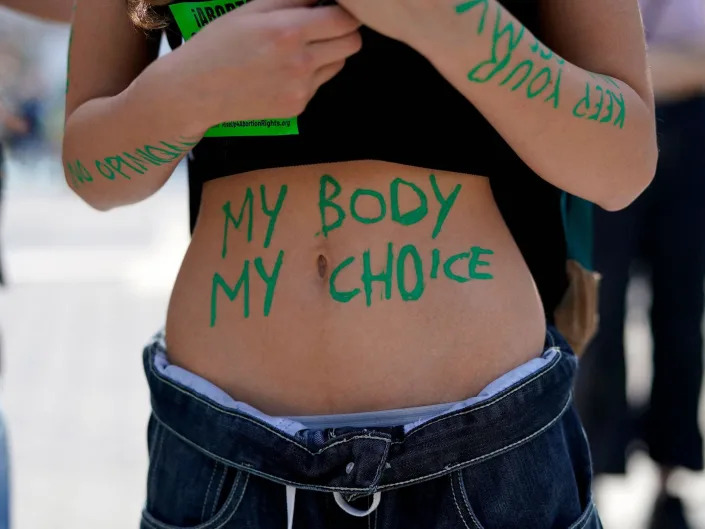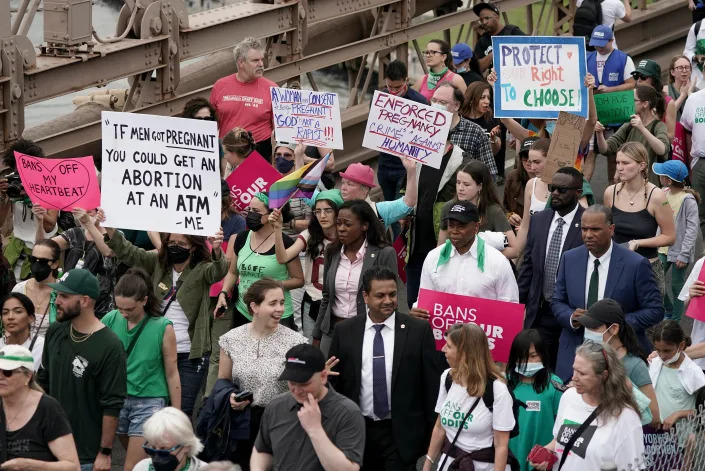37% of Google Maps results for abortion services in trigger states directed people to fake clinics, nonprofit says
11% of Google results for abortions in "trigger states" were for anti-abortion fake clinics, per a story.
On Google Maps, 37% of results were for fake clinics that didn't offer abortions.
There are 13 US "trigger states," which have laws to criminalize abortion if Roe v. Wade is overturned.
People looking on Google for information on abortion in "trigger states" are likely to be served with details for anti-abortion fake clinics that don't offer abortions, a report from nonprofit the Center for Countering Digital Hate (CCDH) found.
Trigger states are those that have laws on the books that would criminalize abortion immediately if the Supreme Court strikes down Roe v. Wade. This is a distinct possibility, according to a draft opinion from the Supreme Court leaked in May.
The states in question are: Arkansas, Idaho, Kentucky, Louisiana, Mississippi, Missouri, North Dakota, South Dakota, Tennessee, Utah, Texas, Oklahoma, and Wyoming.
For its report, London-based CCDH ran Google searches from each of the 13 states using a browser extension that lets people set their computers to different locations in the world.
The CCDH used Google Search and Google Maps to see what results came up on the first page when key terms like "abortion clinic near me" and "abortion pill" were entered.
Out of a total 445 recorded results, 11% directed users to anti-abortion fake clinics.
The problem was particularly acute on Google Maps results, where the CCDH found 26 out of 70 results directed users to fake clinics — a return rate of 37%.
The CCDH used the first three locations presented by Google Maps to collect its sample. The nonprofit isn't the first to report on the issue of anti-abortion clinics slipping into Google results for abortion services.
The BBC reported in May that it had found misleading adverts high up in Google search results, which appeared to be clinics offering abortions, but were actually anti-abortion centres.
One woman told the BBC she went to one clinic after she saw it offered "a free abortion consultation" but once there she was given misinformation about abortions, including claims they were linked to infertility and breast cancer.
The CCDH found on Google Search that 28% of Google ads displayed at the top of search result pages were for anti-abortion fake clinics.
The CCDH said when it visited the websites of the fake clinics surfaced by Google it found misinformation. These included claims that "suicidal impulses" were common after abortions and suggestions that a hysterectomy might be needed to stop an abortion.
A Google spokesperson told Insider: "Across our products, we work to make high-quality information easily accessible, particularly on critical health topics."
It continued: "Any organization that wants to advertise to people seeking information about abortion services on Google must be certified and show in-ad disclosures that clearly state whether they do or do not offer abortions."
The spokesperson added that the company was always looking at ways to improve its results to help people find what they're looking for, or understand if what they're looking for may not be available.
The CCDH said Google did label ads for anti-abortion clincs with a label stating: "Does not provide abortions," but their placement at the top of the results pages was still a problem.
"When people search for information or services relating to their sexual and reproductive health, Google is sending them to sites that users expect to contain robust, scientific, evidence-driven healthcare information – but they actually contain ideologically-driven opinion and misinformation," CCDH chief executive Imran Ahmed said in a statement sent to Insider.
Online data, medical records could be used to put women in jail under new abortion laws
If the Supreme Court rules to overturn Roe v. Wade this month, lawmakers and law enforcement may have varied means to go after women and health care providers who participate in abortions in large part because of technology that didn't exist before the 1973 landmark ruling protecting abortion rights.
That means period tracking apps, tele-health appointments, mail-in pharmacy requests and other online medical records and data could be used as evidence in criminal cases, experts said.
At least 26 states are expected to move quickly to ban abortion if the court's conservative majority strikes down federally-protected abortion rights. Among them are 13 – including Louisiana, Texas, Mississippi, Idaho, Tennessee, Utah and Wyoming – that have "trigger laws" that would take effect automatically or through a quick state action if Roe no longer applies, according to the Guttmacher Institute, a reproductive health research and policy organization.
The National Association of Criminal Defense Lawyers concluded in a report in August that anti-abortion measures will lead to "rampant criminalization through regulatory enforcement and to mass incarceration on an unprecedented scale," especially if Roe is overturned.
Because some states have already passed laws redefining "personhood" to include an unborn child, it's possible people who seek out abortions or anyone who helps them could face charges of feticide or aggravated assault, the report said.
Most of the rhetoric around penalizing illegal abortions has targeted healthcare workers who help people obtain abortions rather than pregnant women, said Brietta Clark, a health law and reproductive justice professor at Loyola Law School in Los Angeles. But she said that unless laws clearly state women won't be prosecuted for the outcomes of their pregnancy, they are still at risk.
Many states regularly bring criminal cases against women who are seen as putting their unborn child's life at risk, including charges of child abuse, child neglect or endangerment or feticide, manslaughter and murder, said Dana Sussman, acting executive director of the National Advocates for Pregnant Women. The group has documented 1,331 cases from 2006 through 2020 where a woman was arrested, detained or otherwise deprived of their liberty for a reason related to their pregnancy. Altogether, since the Roe ruling, the researchers found more than 1,700 of these cases, which they noted is likely an undercount. The majority were economically disadvantaged women of color who often must rely on publicly run or funded hospitals.
"Our criminal codes have ballooned, the War on Drugs has transformed the types of charges that are brought, how many people are criminalized and the communities impacted," Sussman said. "And we have used the criminal legal system to respond to public health crises, to mental health crises, to poverty, to education, in ways that I don't think were fully understood or fully applied back in 1973."
Even in California, which has vowed to become a sanctuary for women seeking abortions, the state's attorney general issued a legal alert in January to law enforcement advising them that the state's penal code "intended to hold accountable those who inflict harm on pregnant individuals, resulting in miscarriage or stillbirth, not to punish people who suffer the loss of their pregnancy."
The proclamation came after two women in California's Central Valley in 2018 and then in 2019 gave birth to stillborn infants and were flagged by medical staff after testing positive for methamphetamine. Both of the women were jailed and eventually charged with fetal murder. The charges against one woman were dismissed in May 2021 and the other woman was freed in March after years in prison.
"Women who have to rely on public healthcare systems have the least amount of privacy, there’s a lot that the state can do through that process to basically monitor, surveil and control," said Clark, the law professor.
It's possible some prosecutors will shy away from pursuing criminal charges against a pregnant person or anyone who helps her seek an abortion.
To date, more than 80 elected district attorneys and attorneys generals around the country, including in red states, have committed to using their discretion to not charge individuals or those who help them in ending a pregnancy should Roe be overturned, said Miriam Krinsky, executive director of Fair and Just Prosecution, an organization that advocates for criminal justice reform.
The nonprofit has been reaching out to elected prosecutors around the country willing to make such a commitment should Roe be overturned, Krinsky said, noting that prosecutors frequently decide whether to use their limited resources to prioritize certain crimes over others.

"We are now facing a moment where elected public prosecutors are going to be the last line of defense," Krinsky said. "Just because something can be prosecuted doesn’t mean it should be prosecuted."
Tom Jipping, a senior legal fellow at the Washington, D.C.-based conservative think tank The Heritage Foundation, said "rogue prosecutors" are "going to be a problem" for lawmakers who want laws criminalizing abortion to be enforced.
"This is not about prosecutorial discretion, it’s about who gets to make the law, and it’s not prosecutors," Jipping said. "If this is something they want to do they ought to run for the legislature."
Jonathan Mitchell, Texas’ former solicitor general who crafted the state’s abortion law SB 8, which enforces a ban on abortion as early as six weeks by enabling private citizens to sue those who aid and abet, told USA TODAY that he doesn’t believe most of the existing legislative efforts by states to ban abortion will be very effective.
In many red states, abortion clinics are located in more liberal cities where the prosecutor won’t bring charges or where it would be hard to get juries to convict even if they do, Mitchell said. And since states do not run the postal service, it's additionally difficult to detect and prosecute those who distribute pregnancy-ending pills on the black market.
“I think anti-abortion advocates who pushed for these trigger bans are going to be disappointed when they take effect,” Mitchell said. “Laws of this sort worked in 1970 or 1960 when every state banned abortion, they didn’t have abortion pills and didn’t have one of our two major political parties committed to the ideology of legal abortion. Also, they didn’t have widespread internet access. What worked in the United States in 1970 is not necessarily going to work in the United States in 2022.”
Unlike in 1973, conservative lawmakers are increasingly concerned about not just ensuring their residents don't undergo abortions in their states, but also outside their borders, legal experts said.
Although it's a "dicey question" as to whether a state can regulate abortions that occur outside its borders, "you'll definitely see efforts to address the issue of abortion travel," Mitchell said.
If states “really want to reduce abortion, they’re going to have to resort to tactics that go beyond the trigger bans,” Mitchell said, such as what SB 8 did.
He added that states are "going to have to rely on private civil enforcement to overcome the unwillingness of local district attorneys to bring charges.”
The risk of criminal charges could stop many women from receiving lifesaving medical care and impact her relationship with her doctor, experts said.
For more vulnerable individuals, like victims of rape or incest, there may be a greater reluctance to report crimes to law enforcement if it complicates their ability to later pursue an abortion while under the watchful eye of law enforcement, said Krinsky of Fair and Just Prosecution.
If there are any complications from these unsafe procedures and the patient turns up at the emergency room seeking help, she may be incentivized to lie to workers or face legal repercussions, Clark said. That could prompt doctors to flag her for law enforcement.
Despite HIPAA, the federal health privacy law, in many states healthcare providers can, and sometimes must, disclose protected information to law enforcement if they believe a crime occurred. Investigators can also subpoena records, for example, from period-tracking apps to build a case against someone – or engage in other types of surveillance, which has prompted some women's health clinics to move to paper records or encrypted communications.
"There's a whole digital footprint question that’s gonna come up a lot in these cases: What research did you do? Who did you text with? Did you go to a crisis pregnancy center?" said Sussman of the National Advocates for Pregnant Women. "That’s a whole other level of potential surveillance that can be coordinated with law enforcement. What credit card purchases did you make? You can almost do nothing without leaving a trail."
Period-tracking app Clue said in a statement that the health data it collects, including about pregnancies, pregnancy loss or abortion "is kept private and safe." Because it is a European company, developed by a Berlin-based tech company, Clue is required to abide by strict protections to health data and "will not disclose it," the company said.
And for victims of domestic violence, these new anti-abortion laws may become another tool of coercion for an abuser, said TuLynn Smylie, who oversees Sojourn, a domestic violence program run by The People Concern, one of Los Angeles County's largest social services agencies.
"He could use that to threaten, 'If you leave me, I'll disclose you had an abortion or you want an abortion,'" Smylie said. "That could definitely become another element of control."
This article originally appeared on USA TODAY: New abortion laws could see many women, doctors face criminal charges


No comments:
Post a Comment